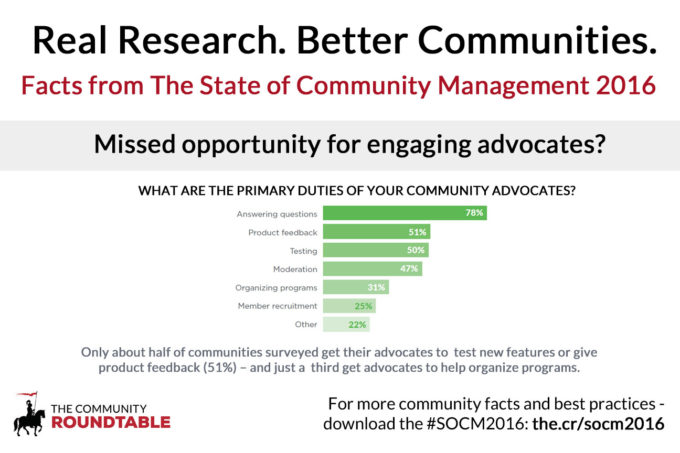By Ted McEnroe, Director of Research and Training
They like you. They really really like you. Your community advocates. They are the ones you love to see – they answer questions and cheer you on and by being engaged they give you a sense that your time and efforts aren’t going unnoticed.
But are you giving them what they want – or getting enough in return?
Our research suggests the answer is “probably not,” in both cases.
In the State of Community Management 2015, we found that while most communities recognized key contributors in some way – with badges and swag most often – they often failed to provide real, business-driven rewards for community advocates, such as opportunities to test products, feedback opportunities and access to executives.
In 2o16, that still holds true – but we built upon the question by asking what communities are asking their advocates to do, as well. While a large majority of communities said their advocates answered questions, half or fewer said they took part in product testing or feedback, moderation, programming or member recruitment.

There are many understandable reasons for this. Many community managers don’t want to overburden their most active members with extra duties that could make them feel used or make them less active in the community. They don’t have the budget or authorization to provide needed training and resources for advocates to be effective in leadership roles. Or they feel like they don’t have the bandwidth themselves to give structure to an advocacy program on top of the rest of their own duties.
But here’s why you should engage your advocates to take on more leadership responsibilities.
- Advocates help you scale yourself as a manager.Getting advocates to take on a greater leadership burden frees you up to focus on more strategic opportunities, which will in turn enhance their own experience as community members. If you can moderate fewer threads and instead develop more robust programming – it’s a win-win.
- Today’s advocates are tomorrow’s community leadersThis may not be true in every use case, but in many communities, the next generation of community managers can be found in the ranks of the current members. Dedicated advocates can provide future leadership – and giving them responsibilities now prepares them for it.
- Expanding roles can strengthen advocates’ dedicationYou know the many versions of the quote, “If you want to understand someone, walk a mile in her shoes.” That’s the premise here. Giving advocates a greater first-hand understanding of the operations and duties of community management gives them insight into how decisions get made – and in difficult times, those allies are critical to have.
- It helps justify (and can expand) investment in advocacy, too.We’ve highlighted the need to improve rewards for advocates already. Giving your advocates rewards they deserve is a balance. Making the case for greater rewards for advocates is easier when they have legitimate responsibilities as well. But when asking for investment from the organization, you need to demonstrate the value of the program to the organization.
The bottom line is this: Empowering your advocates by giving them real opportunities not only helps you, it helps them grow and ultimately provides greater benefits to your organization. It’s an untapped investment that can reap real rewards for both your organization and your key members.
We can’t wait to hear what you think – tag your thoughts with #SOCM2016 to join the conversation!
Are you a member of TheCR Network? Download the research inside the Network here.
